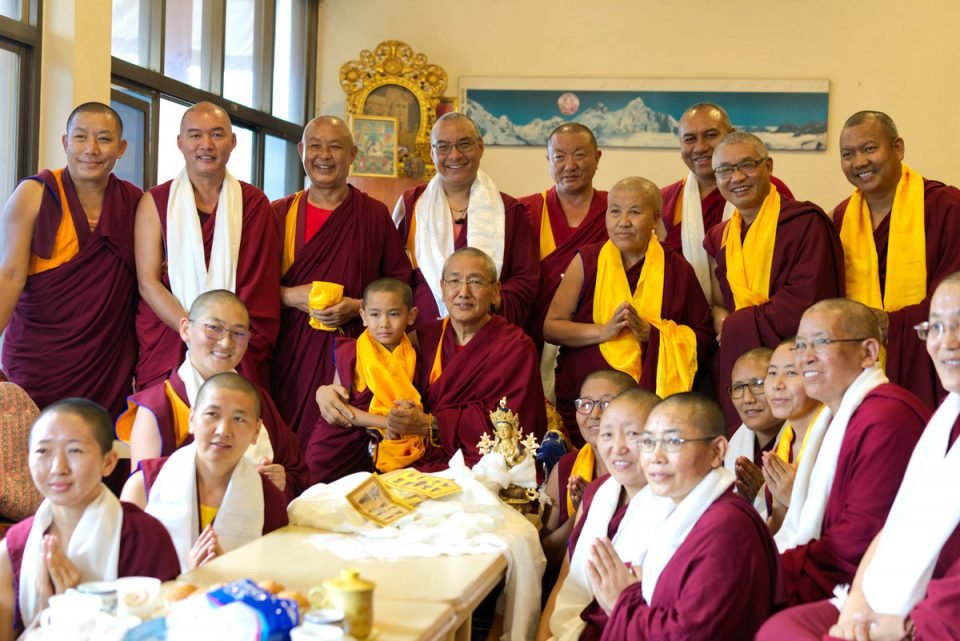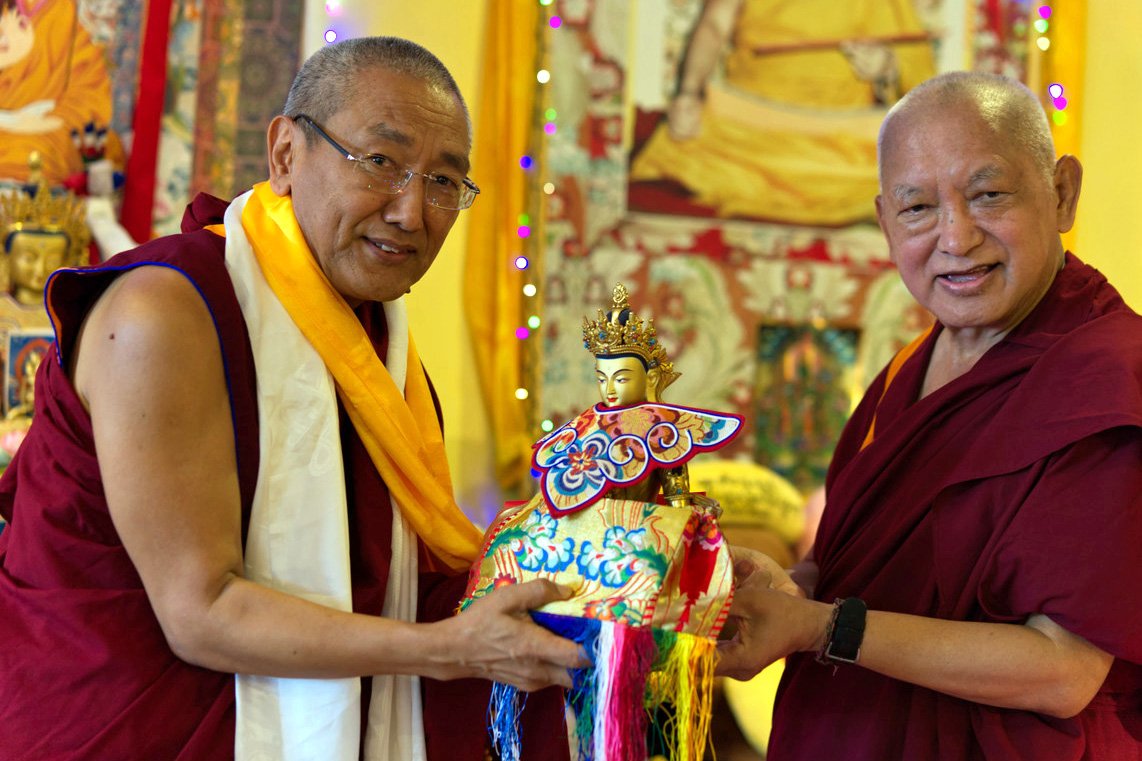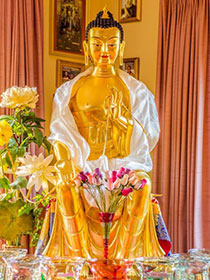- Home
- FPMT Homepage
Foundation for the Preservation of the Mahayana Tradition
The FPMT is an organization devoted to preserving and spreading Mahayana Buddhism worldwide by creating opportunities to listen, reflect, meditate, practice and actualize the unmistaken teachings of the Buddha and based on that experience spreading the Dharma to sentient beings. We provide integrated education through which people’s minds and hearts can be transformed into their highest potential for the benefit of others, inspired by an attitude of universal responsibility and service. We are committed to creating harmonious environments and helping all beings develop their full potential of infinite wisdom and compassion. Our organization is based on the Buddhist tradition of Lama Tsongkhapa of Tibet as taught to us by our founders Lama Thubten Yeshe and Lama Thubten Zopa Rinpoche.
- Willkommen
Die Stiftung zur Erhaltung der Mahayana Tradition (FPMT) ist eine Organisation, die sich weltweit für die Erhaltung und Verbreitung des Mahayana-Buddhismus einsetzt, indem sie Möglichkeiten schafft, den makellosen Lehren des Buddha zuzuhören, über sie zur reflektieren und zu meditieren und auf der Grundlage dieser Erfahrung das Dharma unter den Lebewesen zu verbreiten.
Wir bieten integrierte Schulungswege an, durch denen der Geist und das Herz der Menschen in ihr höchstes Potential verwandelt werden zum Wohl der anderen – inspiriert durch eine Haltung der universellen Verantwortung und dem Wunsch zu dienen. Wir haben uns verpflichtet, harmonische Umgebungen zu schaffen und allen Wesen zu helfen, ihr volles Potenzial unendlicher Weisheit und grenzenlosen Mitgefühls zu verwirklichen.
Unsere Organisation basiert auf der buddhistischen Tradition von Lama Tsongkhapa von Tibet, so wie sie uns von unseren Gründern Lama Thubten Yeshe und Lama Thubten Zopa Rinpoche gelehrt wird.
- Bienvenidos
La Fundación para la preservación de la tradición Mahayana (FPMT) es una organización que se dedica a preservar y difundir el budismo Mahayana en todo el mundo, creando oportunidades para escuchar, reflexionar, meditar, practicar y actualizar las enseñanzas inconfundibles de Buda y en base a esa experiencia difundir el Dharma a los seres.
Proporcionamos una educación integrada a través de la cual las mentes y los corazones de las personas se pueden transformar en su mayor potencial para el beneficio de los demás, inspirados por una actitud de responsabilidad y servicio universales. Estamos comprometidos a crear ambientes armoniosos y ayudar a todos los seres a desarrollar todo su potencial de infinita sabiduría y compasión.
Nuestra organización se basa en la tradición budista de Lama Tsongkhapa del Tíbet como nos lo enseñaron nuestros fundadores Lama Thubten Yeshe y Lama Zopa Rinpoche.
A continuación puede ver una lista de los centros y sus páginas web en su lengua preferida.
- Bienvenue
L’organisation de la FPMT a pour vocation la préservation et la diffusion du bouddhisme du mahayana dans le monde entier. Elle offre l’opportunité d’écouter, de réfléchir, de méditer, de pratiquer et de réaliser les enseignements excellents du Bouddha, pour ensuite transmettre le Dharma à tous les êtres. Nous proposons une formation intégrée grâce à laquelle le cœur et l’esprit de chacun peuvent accomplir leur potentiel le plus élevé pour le bien d’autrui, inspirés par le sens du service et une responsabilité universelle. Nous nous engageons à créer un environnement harmonieux et à aider tous les êtres à épanouir leur potentiel illimité de compassion et de sagesse. Notre organisation s’appuie sur la tradition guéloukpa de Lama Tsongkhapa du Tibet, telle qu’elle a été enseignée par nos fondateurs Lama Thoubtèn Yéshé et Lama Zopa Rinpoché.
Visitez le site de notre Editions Mahayana pour les traductions, conseils et nouvelles du Bureau international en français.
Voici une liste de centres et de leurs sites dans votre langue préférée
- Benvenuto
L’FPMT è un organizzazione il cui scopo è preservare e diffondere il Buddhismo Mahayana nel mondo, creando occasioni di ascolto, riflessione, meditazione e pratica dei perfetti insegnamenti del Buddha, al fine di attualizzare e diffondere il Dharma fra tutti gli esseri senzienti.
Offriamo un’educazione integrata, che può trasformare la mente e i cuori delle persone nel loro massimo potenziale, per il beneficio di tutti gli esseri, ispirati da un’attitudine di responsabilità universale e di servizio.
Il nostro obiettivo è quello di creare contesti armoniosi e aiutare tutti gli esseri a sviluppare in modo completo le proprie potenzialità di infinita saggezza e compassione.
La nostra organizzazione si basa sulla tradizione buddhista di Lama Tsongkhapa del Tibet, così come ci è stata insegnata dai nostri fondatori Lama Thubten Yeshe e Lama Zopa Rinpoche.
Di seguito potete trovare un elenco dei centri e dei loro siti nella lingua da voi prescelta.
- 欢迎 / 歡迎
简体中文
“护持大乘法脉基金会”( 英文简称:FPMT。全名:Foundation for the Preservation of the Mahayana Tradition) 是一个致力于护持和弘扬大乘佛法的国际佛教组织。我们提供听闻,思维,禅修,修行和实证佛陀无误教法的机会,以便让一切众生都能够享受佛法的指引和滋润。
我们全力创造和谐融洽的环境, 为人们提供解行并重的完整佛法教育,以便启发内在的环宇悲心及责任心,并开发内心所蕴藏的巨大潜能 — 无限的智慧与悲心 — 以便利益和服务一切有情。
FPMT的创办人是图腾耶喜喇嘛和喇嘛梭巴仁波切。我们所修习的是由两位上师所教导的,西藏喀巴大师的佛法传承。
繁體中文
護持大乘法脈基金會”( 英文簡稱:FPMT。全名:Found
ation for the Preservation of the Mahayana Tradition ) 是一個致力於護持和弘揚大乘佛法的國際佛教組織。我們提供聽聞, 思維,禪修,修行和實證佛陀無誤教法的機會,以便讓一切眾生都能 夠享受佛法的指引和滋潤。 我們全力創造和諧融洽的環境,
為人們提供解行並重的完整佛法教育,以便啟發內在的環宇悲心及責 任心,並開發內心所蘊藏的巨大潛能 — 無限的智慧與悲心 – – 以便利益和服務一切有情。 FPMT的創辦人是圖騰耶喜喇嘛和喇嘛梭巴仁波切。
我們所修習的是由兩位上師所教導的,西藏喀巴大師的佛法傳承。 察看道场信息:
- FPMT Homepage
- News/Media
-
- Study & Practice
-
-
- About FPMT Education Services
- Latest News
- Programs
- New to Buddhism?
- Buddhist Mind Science: Activating Your Potential
- Heart Advice for Death and Dying
- Discovering Buddhism
- Living in the Path
- Exploring Buddhism
- FPMT Basic Program
- FPMT Masters Program
- FPMT In-Depth Meditation Training
- Maitripa College
- Lotsawa Rinchen Zangpo Translator Program
- Universal Education for Compassion & Wisdom
- Online Learning Center
-
- Prayers & Practice Materials
- Overview of Prayers & Practices
- Full Catalogue of Prayers & Practice Materials
- Explore Popular Topics
- Benefiting Animals
- Chenrezig Resources
- Death & Dying Resources
- Lama Chopa (Guru Puja)
- Lama Zopa Rinpoche: Compendium of Precious Instructions
- Lama Zopa Rinpoche: Life Practice Advice
- Lama Zopa Rinpoche Practice Series
- Lamrim Resources
- Mantras
- Prayer Book Updates
- Purification Practices
- Sutras
- Thought Transformation (Lojong)
- Audio Materials
- Dharma Dates - Tibetan Calendar
- Translation Services
- Publishing Services
- Ways to Offer Support
- Prayers & Practice Materials
-
- Teachings and Advice
- Find Teachings and Advice
- Lama Zopa Rinpoche Advice Page
- Lama Zopa Rinpoche: Compendium of Precious Instructions
- Lama Zopa Rinpoche Video Teachings
- ༧སྐྱབས་རྗེ་བཟོད་པ་རིན་པོ་ཆེ་མཆོག་ནས་སྩལ་བའི་བཀའ་སློབ་བརྙན་འཕྲིན།
- Podcasts
- Lama Yeshe Wisdom Archive
- Buddhism FAQ
- Dharma for Young People
- Resources on Holy Objects
- Teachings and Advice
-
-
*If a menu item has a submenu clicking once will expand the menu clicking twice will open the page.
-
-
- Centers
-
- Teachers
-
- Projects
-
-
-
-
*If a menu item has a submenu clicking once will expand the menu clicking twice will open the page.
-
-
- FPMT
-
- Shop
-
-
-
The Foundation Store is FPMT’s online shop and features a vast selection of Buddhist study and practice materials written or recommended by our lineage gurus. These items include homestudy programs, prayers and practices in PDF or eBook format, materials for children, and other resources to support practitioners.
Items displayed in the shop are made available for Dharma practice and educational purposes, and never for the purpose of profiting from their sale. Please read FPMT Foundation Store Policy Regarding Dharma Items for more information.
-
-
16

Lama Zopa Rinpoche with Khen Rinpoche Geshe Chonyi at Kopan Monastery, May 2020. Photo by Ven. Lobsang Sherab.
Khen Rinpoche Geshe Thubten Chonyi is abbot of Kopan Monastery and Kopan Nunnery, the FPMT monastic institutions in Kathmandu, Nepal, and resident geshe at Amitabha Buddhist Centre (ABC), the FPMT center in Singapore. This story is based on the July 2020 video “The Story of Khen Rinpoche Geshe Thubten Chonyi and the History of Kopan Monastery,” in which Khen Rinpoche shares his experiences from when he was a boy in the Solu Khumbu District of Nepal to being a monk at Kopan in the 1970s to becoming the abbot of Kopan Monastery.
Khen Rinpoche Geshe Thubten Chonyi was born in Solu Khumbu District, Nepal, in 1962, and was ordained by Lama Zopa Rinpoche at the age of twelve on Tibetan New Year.
His father, a carpenter, had developed a wish for one of his sons to become a monk after visiting Lawudo Gompa in Solu Khumbu—where Lama Zopa Rinpoche’s previous incarnation had meditated and where Rinpoche had established a monastery school called the Mount Everest Centre for Buddhist Studies in 1971—and seeing the little monks there. Lama Thubten Yeshe and Max Mathews (known as Mummy Max) visited their village in 1974, looking for young boys to join the Mount Everest Centre, which eventually moved year round to Kopan Monastery.
Khen Rinpoche’s father set out to meet Lama Yeshe, bringing along only Khen Rinpoche’s younger brother. But then before reaching Lama Yeshe, as Khen Rinpoche recounts, his father thought that he had better bring Khen Rinpoche, too, reasoning that if Lama Yeshe doesn’t accept both of his sons, he will accept one son. So his father returned home to get Khen Rinpoche.
“My mother told me that at that time I was washing my feet,” Khen Rinpoche says. “I was so excited to see Lama Yeshe. So I just completed washing one leg and had no time to wash the other leg. [As I left to go meet Lama Yeshe] I was wearing one shoe on my foot and carrying one shoe in my hand and rushing.” Happily, Lama Yeshe accepted Khen Rinpoche.
Four or five years after he began his monastic studies, Khen Rinpoche’s older brother, who was living in Kathmandu, advised Khen Rinpoche to leave the monastery and go to a school, thinking his brother wasn’t really studying at the monastery. When Khen Rinpoche consulted Khensur Rinpoche Lama Lhundrup, who was overseeing monastic education at Kopan, Khensur Rinpoche said, “If you go to a school what can you achieve? Just the basic knowledge, not much more than that. But then you are also creating so much negative karma in your life. So even if you don’t learn much, it is better to stay in the monastery. In this way every day you can collect merit all the time.”
Many teachers from Sera Je Monastery in South India, such as Geshe Doga and Geshe Jampa Gyatso, came to visit Kopan Monastery and teach philosophy. Scholastic monks from Sera Je Monastery also would sometimes stay at Kopan while on pilgrimage in Kathmandu. “Then we had to debate with them,” Khen Rinpoche explains. “Most of us were not good in debate at that time, so we were very nervous to debate with them. … I noticed that whatever questions were asked to the monks from Sera, they answered very well.” This inspired Khen Rinpoche to want to know everything about Buddhist philosophy.

Khen Rinpoche Geshe Thubten Chonyi with Kopan monastics celebrating his birthday at Kopan Monastery, Kathmandu, Nepal, July 2020. Photo by Ven. Lobsang Sherab.
In 1980, Khensur Rinpoche Lama Lhundrup, Lama Yeshe, and Lama Zopa Rinpoche decided to send twelve Kopan monks to Sera Je Monastery to study. Lama Yeshe and Khensur Rinpoche asked Khen Rinpoche if he would want to go to Sera, which he did.
Khensur Rinpoche then accompanied the group of Kopan monks to Sera Je Monastery and stayed with them for the first month. Feeling discouraged after the first month, Khen Rinpoche told Khensur Rinpoche that he didn’t understand anything and wanted to return to Kopan. Khensur Rinpoche said, “One month is too short. So you must stay longer and try.”
Three or four months later, still feeling discouraged, Khen Rinpoche thought to return to Kopan. “But,” he said, “I didn’t have contact with my parents or my brother. At the same time I didn’t have money. So I couldn’t go back because there was no money for me to go back.”
After one year things improved. He understood more of what was being taught so he could debate with others. And Merry Colony, a long-time FPMT American student, began helping him at the request of Lama Zopa Rinpoche. Merry sponsored Khen Rinpoche until he graduated, about twenty years. He said, “Because of her support, I had a deep interest to study. Because of that, I was able to complete my studies.”

Khen Rinpoche Geshe Thubten Chonyi and Lama Zopa Rinpoche celebrating Khen Rinpoche’s birthday at Kopan Monastery, Kathmandu, Nepal, July 2020. Photo by Ven. Lobsang Sherab.
Khen Rinpoche received the geshe lamrampa degree in 1997 and then completed a year of study at Gyudmed Tantric College. After he completed his studies, his mother told him a story he had never heard before.
When he was three years old, she and his father decided to go to India and leave Khen Rinpoche with his grandparents in Nepal. One week after leaving Khen Rinpoche with his grandparents, she had a dream that he was requesting to her, “Please don’t go.” Feeling uneasy and worried something might happen to him if she went to India, she set out the next morning to bring him home. His father, unhappy, went to India alone. Shortly afterwards Khen Rinpoche became very sick. If she had gone to India, she told him, then he probably would have died.
He says, “When I heard that, it really touched my heart and tears came to my eyes. If my mother didn’t protect me at that time, then there’s no way I can study, no way I can graduate, no way I can teach.”
After completing his studies Khen Rinpoche taught philosophy to the young monks at Kopan for nine or ten months. Then Lama Zopa Rinpoche decided to send Khen Rinpoche to teach at Amitabha Buddhist Centre, the FPMT center in Singapore, and the center invited him.
When he went to Singapore in October 1999 he thought he would just try it for one year, but has now been there twenty-one years. After Khen Rinpoche began to teach the FPMT Basic Program at ABC at Lama Zopa Rinpoche’s request, Khen Rinpoche says, “Many people showed a big interest, especially the senior students. All of them came to the class. At the same time, I saw that people were very interested in learning Buddhist philosophy. They had very busy lives. They were at their jobs from morning until evening. Then they would have a quick dinner and come to class from 7:30-9:30 p.m. twice per week. When I saw that, it really encouraged me to teach more and share with them what I learned.”
About Lama Zopa Rinpoche’s visit to ABC in 2019, Khen Rinpoche says, “Rinpoche expressed that he was extremely happy about the center. He said that his wish is fulfilled. When Rinpoche expressed his happiness it really touched my heart. I am able to make a little contribution to fulfill Rinpoche’s wishes.”
In 2011, when Khensur Rinpoche Lama Lhundrup’s sickness got worse, Lama Zopa Rinpoche asked Khen Rinpoche to become abbot of Kopan. He advised Khen Rinpoche to spend eight months each year teaching at ABC and four months looking after Kopan.
“Who I am now is truly due to the kindness of the teacher, the gurus who teach me, who guide me, who show me the true path,” Khen Rinpoche says. “The best way to repay the guru’s kindness is to follow the guru’s advice as much as possible and fulfill the guru’s wishes. This way we make our lives meaningful.”
Watch “The Story of Khen Rinpoche Geshe Thubten Chonyi and the History of Kopan Monastery” on YouTube:
https://youtu.be/-4GMJ-68xI8
You can find more information about Kopan Monastery and Kopan Nunnery online.
For information about Amitabha Buddhist Centre, please visit their website.
- Home
- News/Media
- Study & Practice
- About FPMT Education Services
- Latest News
- Programs
- New to Buddhism?
- Buddhist Mind Science: Activating Your Potential
- Heart Advice for Death and Dying
- Discovering Buddhism
- Living in the Path
- Exploring Buddhism
- FPMT Basic Program
- FPMT Masters Program
- FPMT In-Depth Meditation Training
- Maitripa College
- Lotsawa Rinchen Zangpo Translator Program
- Universal Education for Compassion & Wisdom
- Online Learning Center
- Prayers & Practice Materials
- Overview of Prayers & Practices
- Full Catalogue of Prayers & Practice Materials
- Explore Popular Topics
- Benefiting Animals
- Chenrezig Resources
- Death & Dying Resources
- Lama Chopa (Guru Puja)
- Lama Zopa Rinpoche: Compendium of Precious Instructions
- Lama Zopa Rinpoche: Life Practice Advice
- Lama Zopa Rinpoche Practice Series
- Lamrim Resources
- Mantras
- Prayer Book Updates
- Purification Practices
- Sutras
- Thought Transformation (Lojong)
- Audio Materials
- Dharma Dates – Tibetan Calendar
- Translation Services
- Publishing Services
- Teachings and Advice
- Find Teachings and Advice
- Lama Zopa Rinpoche Advice Page
- Lama Zopa Rinpoche: Compendium of Precious Instructions
- Lama Zopa Rinpoche Video Teachings
- ༧སྐྱབས་རྗེ་བཟོད་པ་རིན་པོ་ཆེ་མཆོག་ནས་སྩལ་བའི་བཀའ་སློབ་བརྙན་འཕྲིན།
- Podcasts
- Lama Yeshe Wisdom Archive
- Buddhism FAQ
- Dharma for Young People
- Resources on Holy Objects
- Ways to Offer Support
- Centers
- Affiliates Area
- Teachers
- Projects
- Charitable Projects
- Make a Donation
- Applying for Grants
- News about Projects
- Other Projects within FPMT
- Support International Office
- Projects Photo Galleries
- Give Where Most Needed
- FPMT
- Shop
Translate*
*powered by Google TranslateTranslation of pages on fpmt.org is performed by Google Translate, a third party service which FPMT has no control over. The service provides automated computer translations that are only an approximation of the websites' original content. The translations should not be considered exact and only used as a rough guide.Unlike an external enemy, the inner enemy cannot regroup and launch a comeback once it has been destroyed from within.








